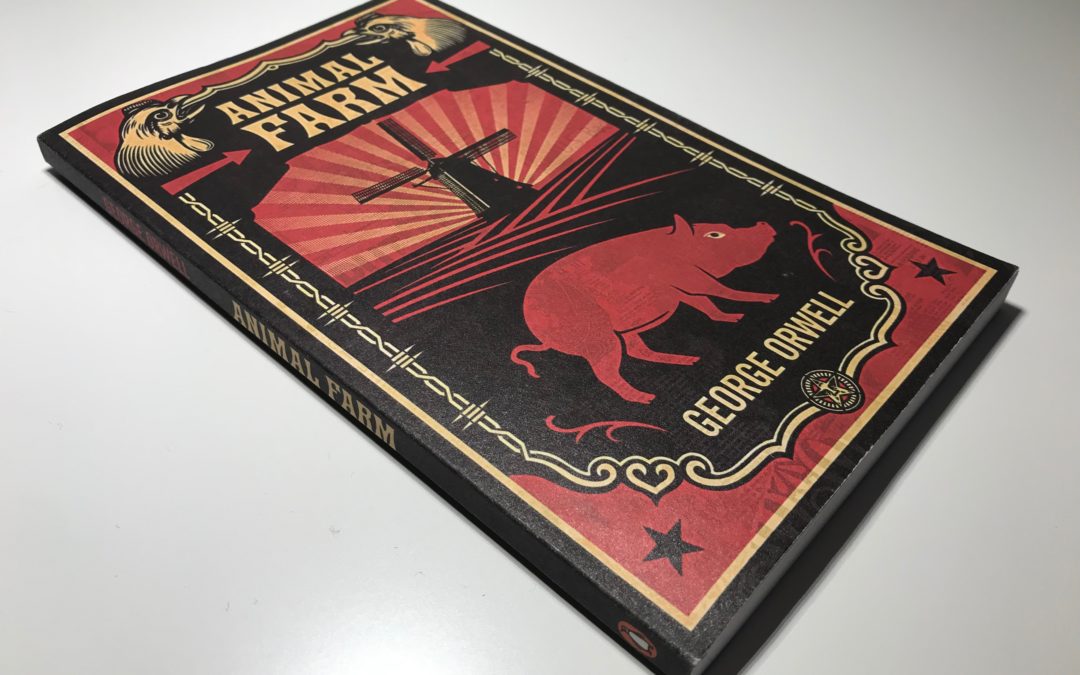Animal Farm is one of the classics of political literature. Originally labeled as a fairy story by George Orwell, this allegorical novella is a critical comment on failed revolutions, blind trust, and personality cults.
First published after the end of World War II in 1945, the well-known British author primarily intended this fable to be a sharp satire on the Russian Revolution in 1917 and the ensuing Stalinist reign of terror in the Soviet Union, particularly between 1936 and 1938. Even though the more or less subtle allegories and symbols can be pigeonholed into this historical period and place, I want to assert that they can also be related to more recent political and social developments. In this day and age, we unfortunately still have to deal with authoritarian leaders, the oppression of the people in some states, and the unchallenged adoption of dubious decisions.
So first, let’s have a brief look at the plot of the fable: One night, all the animals of Manor Farm assemble around Old Major, a very wise and elderly boar, in the barn. Old Major calls for a revolution on the farm as the farmer Mr. Jones neglects for the animals. On the eve of his death, Old Major calls for a revolt against the oppression and fuels the animals’ resentment against the farmer. Now, Napoleon, Snowball, and Squealer, three other pigs, take over and draw up a new system for a life without humans on the farm which they call animalism. Three months later, the revolt begins and the animals emerge victoriously. The farm is now called “Animal Farm” and seven commandments that comprise the premises of the new system and that aim at preventing the humane assimilation of the animals are established:
- Whatever goes on two legs is an enemy.
- Whatever goes upon four legs, or has wings, is a friend.
- No animal shall wear clothes.
- No animal shall sleep in a bed.
- No animal shall drink alcohol.
- No animal shall kill any other animal.
- All animals are equal. (Orwell 2008, p. 15)
Being independent and hopeful, the animals on the farm are now full of zest and grateful for their new leader, Napoleon. Their new goal is to build a windmill in order to have electricity on the farm, but not everyone is convinced by this idea so that Napoleon regards it necessary to drive out his critics. He gradually reduces the political agency of the animals by abolishing collective votes, denunciating and eliminating his opponents, making false accusations and establishing an intelligence service consisting of dogs that follow every command without scrutiny. Grave injustices start to reign on Animal Farm, where the pigs slowly but surely start to use their superior position and take advantage of the gullibility of the other animals. The commandments are amended in favor of the pigs and in the very end, there is only one left, namely: “All animals are equal, but some animals are more equal than others.” (Orwell 2008, p. 90).
Now, what can we learn from the failure of Animal Farm? Obviously, there is a highly political message behind this story, namely that a revolution does not have to be successful in that it results in the hoped-for overall improvement of living conditions; It can equally lead to new unjust power structures and thus also worsen the social and economic life circumstances of the people (or animals, for that matter) that depend on the system. I believe that Animal Farm moreover calls attention to the workings of propaganda and denunciation as well as the unquestioned trust that is given to a few responsible figures which enable them to extend their power to take advantage of the system and control the masses by controlling the pieces of information they are provided with, for one thing, and for another, by oppressing them with inequitable means such as hard work, unjust distribution of goods, and the restriction of freedom of expression due to the fear of severe consequences. In my opinion, this book teaches us to also always question what is presented as being favorable, which we often tend to not do, and to take action before it is too late. In this, I believe, Animal Farm confronts us with highly current phenomena and issues. Take, for instance, the indifference of the majority of people toward the rise of rightist discourse, the unquestioned enthusiasm towards populist politicians, the low voter turnout in some areas particularly at the municipal level, or the absence of consequences of verbal attacks and questionable policy-making for high-ranking politicians.
For those of you who are now interested in the book but who don’t like reading too much: Click here to watch the 1954 cartoon movie version of Animal Farm, and here for the full audiobook!
Orwell, George (2008): Animal Farm. London: Penguin.



